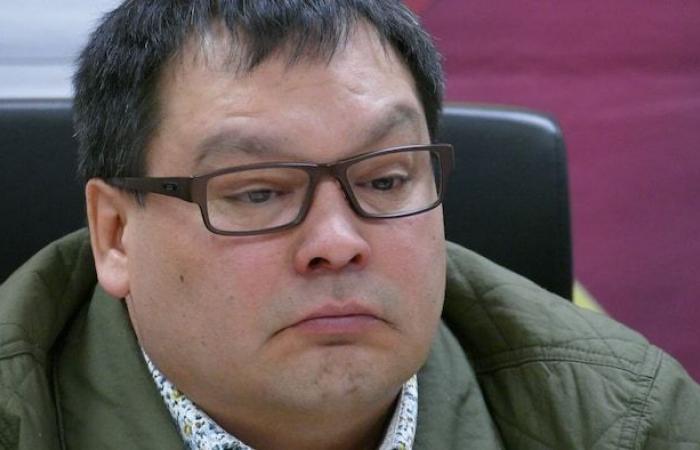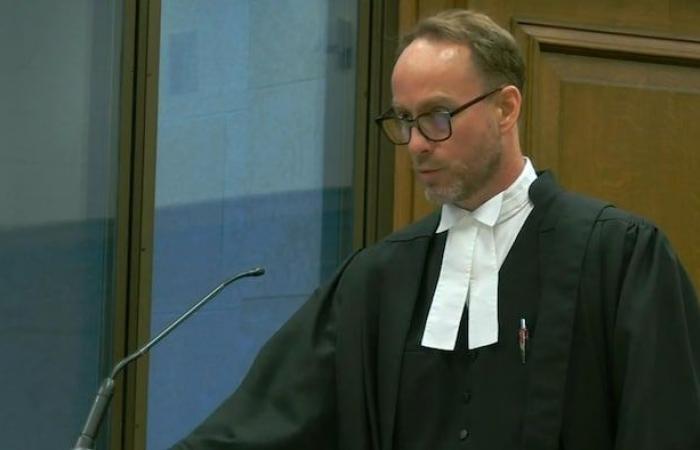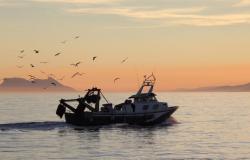This class action on drinking water (new window)brought by the Shamattawa First Nation, located in northern Manitoba, was launched in 2022 and began Monday.
Shamattawa First Nation, which has been under a boil water advisory since 2018, and its chief Jordna Hill are suing the government on behalf of all First Nations people across the country whose community has been under a boil water advisory since 2018. subject to a boil water advisory in effect on or after June 20, 2020.
Fifty-nine other First Nations have joined as civil parties in this case.
Jordna Hill, Chief of the Shamattawa First Nation, launched the class action. (Archive photo)
Photo : Radio-Canada / Jeff Stapleton
Scott Farlinger, legal counsel to Justice Canada, told the court Tuesday that Canada readily recognizes
that previous governments have underfunded First Nations water services.
But in the eyes of the current government, the situation is not the same today as in 1995
Mr. Farlinger told Judge Paul Favel of the Federal Court in Ottawa.
Still according to Mr. Farlinger, this case is very different from previous class actions on access to water, which the Liberal government settled out of court for an amount of eight billion (new window) of dollars, an amount that covers drinking water advisories dating back to 1995.
Canada maintains that it has deployed significant measures, including billions of dollars for new water infrastructure and services on reserves, resulting in the lifting of more than 140 drinking water advisories on long term since 2015. Thirty-three opinions nevertheless remain in force.
The current government’s political commitment to access to drinking water on reserves is unwavering. This is the extent of the efforts made by the government.
The complainants, who describe the situation as urgent human rights crisis
filed a motion for summary judgment that Canada has a legal obligation to ensure that First Nations have safe drinking water.
Mr. Farlinger told the court that Canada is not saying that everything is better now
and does not say that all the problems are resolved. He therefore underlines that Canada knows that problems may exist in certain communities, but that the current motion is limited to the question of Canada’s legal obligations.
Crown attorney Scott Farlinger (File photo)
Photo : Radio-Canada
On this point, Ottawa maintains that it provides funding and program support for on-reserve water infrastructure in the context of public policy and the exercise of the federal government’s spending power
.
In other words, he argues that imposing a legal obligation to ensure that First Nations have clean water could hinder the government’s ability to make policy decisions about how to distribute limited funds among groups and competing interests.
Canada’s spending on First Nations water necessarily competes with the rest of its budgetary allocations.
In the context of the program, the budget must also be distributed between regions and establish priorities among competing First Nations.
A national shame
argue the plaintiffs
The plaintiffs’ response is expected Wednesday, at which time the hearing on this specific motion will conclude.
The complainants’ written response suggests that they will dispute that Canada’s commitment is in fact unwavering.
If this were the case, this action would not be necessary
we can read in this response.
The complainants say it is problematic that Canada has dealt with this subject for a long time as a simple question of good governance, and sometimes as a question of charity, without any responsibility
.
They say First Nations now know they cannot count on Canada’s promises.
This action proved necessary because saying “trust us” is no longer enough given the trials we have endured.
In a September 15 letter to her MP, Chief Jordna Hill accused Canada of pointing the finger at First Nations.
Canada’s decision to fight First Nations for access to clean water is a national shame
Mr. Hill wrote to Niki Ashton, of New Democratic PartyNPDwhose constituency includes Shamattawa.
Ms Ashton told CBC Indigenous that she found the treatment heartbreaking and the arguments hypocritical. The head of New Democratic PartyNPDJagmeet Singh, also spoke on Tuesday.
Justin Trudeau, call your lawyers, Mr. Singh published in English on
Start of the Twitter widget. Skip the widget?
End of Twitter widget. Return to start of widget?
In a statement, Indigenous Services Canada says Canada respects the decision of the Shamattawa First Nation to seek help from the court on this important issue.
In that same statement, the federal department referenced the Liberals’ drinking water bill for First Nations, which it said will hold the government to account.
Everyone in Canada should have access to reliable, safe and clean drinking water
we can read there.
In court on Monday, the plaintiffs’ lawyer, Michael Rosenberg, a partner at McCarthy Tétrault LLP in Toronto, accused Canada of blaming the victims.
Mr. Farlinger rejected the suggestion, saying Canada only wanted to highlight the variability
that exists between communities, i.e. differences in systems, challenges, circumstances and impacts.
The idea that the suggestion of variability amounts to Canada blaming the class action members is nowhere to be found in our materials
he declared.
Based on an article by Brett Forester, CBC News







